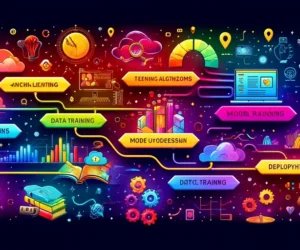
Is Cheap Machine Learning AI Effective for Small Businesses?

Machine learning AI offers powerful tools for data analysis and decision-making, but the cost can be a barrier for small businesses. However, affordable machine learning solutions can provide significant benefits, helping small businesses to leverage their data effectively without breaking the bank.
- Benefits of Cheap Machine Learning AI for Small Businesses
- Considerations for Choosing Cheap Machine Learning AI
- Valuable Insights From Data Analysis
- Informed Decisions
- Enhance Customer Experience and Engagement
- Personalize Their Marketing Efforts
- Patterns and Trends in Customer Behavior
- Predicting Future Outcomes
- Stay Competitive in the Market
Benefits of Cheap Machine Learning AI for Small Businesses
Benefits of cheap machine learning AI for small businesses include cost savings, scalability, and accessibility. Affordable AI solutions enable small businesses to implement advanced analytics and automation without the need for large investments in infrastructure or specialized personnel.
One of the primary advantages is cost savings. Many cheap machine learning tools are available as cloud-based services or open-source software, reducing the need for upfront investments in hardware and software. These solutions offer scalable pricing models, allowing businesses to pay only for the resources they use. This flexibility makes it easier for small businesses to adopt machine learning without incurring significant expenses.
Another benefit is scalability. Cheap machine learning AI solutions can grow with the business, adapting to increasing data volumes and complexity. This scalability ensures that small businesses can continue to benefit from machine learning as they expand, without needing to invest in new infrastructure or tools. Additionally, these solutions often come with user-friendly interfaces and pre-built models, making them accessible to non-experts.
Understanding Long Short Term Memory (LSTM) in Machine LearningFinally, accessibility is a crucial benefit. Affordable machine learning tools are designed to be easy to use, with intuitive interfaces and comprehensive documentation. This accessibility enables small businesses to quickly implement and benefit from machine learning, even if they lack in-house data science expertise. By democratizing access to advanced analytics, cheap machine learning AI empowers small businesses to compete more effectively in the market.
Considerations for Choosing Cheap Machine Learning AI
Considerations for choosing cheap machine learning AI involve evaluating the specific needs of the business, the capabilities of the AI solutions, and the potential return on investment. It is essential to select tools that align with the business's goals and can deliver tangible benefits.
Firstly, identify business needs. Understanding the specific problems that need solving and the desired outcomes will help in selecting the most suitable machine learning tools. This step involves assessing the type of data available, the complexity of the tasks, and the expected impact on the business. Clearly defining these needs ensures that the chosen solution will address the most critical areas effectively.
Secondly, evaluate capabilities. Different machine learning tools offer varying levels of functionality, from basic analytics to advanced predictive modeling. It is essential to choose a solution that matches the business's technical requirements and expertise. Key factors to consider include ease of use, scalability, integration with existing systems, and the availability of support and training resources. This evaluation ensures that the business can fully leverage the capabilities of the chosen tool.
Choosing Reinforcement Learning Models: A Comprehensive GuideLastly, consider the return on investment (ROI). While cheap machine learning AI solutions can be cost-effective, it is crucial to ensure that they provide a good ROI. This evaluation involves comparing the cost of the solution with the expected benefits, such as increased efficiency, improved decision-making, and enhanced customer engagement. By carefully assessing the ROI, small businesses can ensure that their investment in machine learning delivers meaningful value.
Valuable Insights From Data Analysis
Valuable insights from data analysis enable small businesses to make informed decisions and optimize their operations. Cheap machine learning AI can uncover patterns and trends within data, providing actionable insights that drive business growth.
Machine learning algorithms can analyze large volumes of data quickly and accurately, identifying hidden relationships and correlations. These insights help businesses understand customer behavior, market trends, and operational inefficiencies. For example, machine learning can reveal which products are most popular among different customer segments, which marketing strategies are most effective, and where cost savings can be achieved.
By leveraging these insights, small businesses can optimize their operations, reducing costs and increasing efficiency. For instance, machine learning can improve inventory management by predicting demand patterns, ensuring that the right products are available at the right time. Additionally, data analysis can enhance pricing strategies by identifying optimal price points based on customer behavior and market conditions.
Understanding the Distinction: Neural Networks vs Machine LearningOverall, the ability to extract valuable insights from data analysis empowers small businesses to make data-driven decisions, improving their competitiveness and profitability.
Informed Decisions
Informed decisions are crucial for the success of small businesses, and machine learning AI plays a significant role in providing the necessary insights. By leveraging data analysis, businesses can make strategic choices that are backed by evidence, reducing the risk of costly mistakes.
Machine learning algorithms can process and analyze data more efficiently than traditional methods, providing real-time insights that inform decision-making. For example, predictive analytics can forecast future sales trends, helping businesses plan their inventory and marketing strategies accordingly. Similarly, customer segmentation analysis can identify key demographics and preferences, guiding targeted marketing efforts.
By making informed decisions based on data-driven insights, small businesses can optimize their resource allocation, improve customer satisfaction, and increase their competitive advantage. This proactive approach ensures that businesses can adapt to changing market conditions and seize new opportunities effectively.
Key Concepts in Murphy's Probabilistic ML ExplainedEnhance Customer Experience and Engagement
Enhancing customer experience and engagement is a key benefit of machine learning AI for small businesses. By understanding customer behavior and preferences, businesses can tailor their offerings and interactions to meet customer needs more effectively.
Machine learning algorithms can analyze customer data to identify patterns and trends, enabling personalized recommendations and targeted marketing. For example, recommendation engines can suggest products based on past purchases, increasing the likelihood of repeat sales. Additionally, machine learning can optimize customer service by predicting and addressing common issues before they escalate, improving overall satisfaction.
Enhanced customer engagement leads to higher retention rates and increased brand loyalty. By delivering personalized experiences and proactive support, small businesses can build stronger relationships with their customers, fostering long-term growth and success.
Personalize Their Marketing Efforts
Personalizing marketing efforts is a powerful application of machine learning AI for small businesses. Personalized marketing involves tailoring messages and offers to individual customers based on their preferences, behaviors, and interactions.
Java Machine Learning Projects: A Comprehensive GuideMachine learning algorithms can analyze customer data to create detailed profiles and segments. These profiles enable businesses to deliver highly relevant and personalized marketing campaigns, increasing engagement and conversion rates. For example, machine learning can identify the best times to send emails, the most effective messaging, and the optimal channels for reaching specific customer segments.
Personalized marketing not only improves customer satisfaction but also maximizes the return on marketing investment. By targeting the right customers with the right messages, businesses can achieve better results with fewer resources, driving growth and profitability.
Patterns and Trends in Customer Behavior
Identifying patterns and trends in customer behavior is essential for understanding and anticipating customer needs. Machine learning AI can analyze vast amounts of data to uncover these patterns, providing insights that drive effective marketing, sales, and customer service strategies.
Improved Customer Segmentation
Improved customer segmentation involves grouping customers based on shared characteristics and behaviors. Machine learning algorithms can identify these segments more accurately than traditional methods, enabling businesses to tailor their strategies to each group. Effective segmentation leads to more personalized and relevant customer interactions, enhancing satisfaction and loyalty.
The Risks of Uncontrolled Machine Learning AlgorithmsPersonalized Recommendations
Personalized recommendations are a key driver of customer engagement and sales. Machine learning algorithms analyze past customer behavior to suggest products and services that are likely to interest them. This personalization increases the likelihood of purchases and repeat business, driving revenue growth for small businesses.
Automated Fraud Detection
Automated fraud detection leverages machine learning to identify suspicious activities and prevent fraudulent transactions. By analyzing transaction patterns and anomalies, machine learning algorithms can detect potential fraud in real-time, protecting businesses and their customers from financial losses.
Predicting Future Outcomes
Predicting future outcomes is a powerful capability of machine learning AI, enabling businesses to make proactive decisions and plan for the future. Predictive models analyze historical data to forecast trends, such as sales, customer behavior, and market dynamics.
These predictions help businesses anticipate demand, manage inventory, and optimize pricing strategies. For example, machine learning can forecast seasonal sales patterns, allowing businesses to stock appropriate inventory levels and plan marketing campaigns accordingly. By accurately predicting future outcomes, businesses can reduce uncertainty and make more informed strategic decisions.
Stay Competitive in the Market
Staying competitive in the market requires small businesses to leverage advanced technologies like machine learning AI. By adopting affordable AI solutions, businesses can enhance their operations, improve customer engagement, and make data-driven decisions that drive growth.
Machine learning AI enables small businesses to compete with larger enterprises by providing access to advanced analytics and automation. These technologies help businesses optimize their processes, reduce costs, and deliver superior customer experiences. By staying at the forefront of technological advancements, small businesses can maintain their competitive edge and thrive in a rapidly evolving market.
Cheap machine learning AI offers numerous benefits for small businesses, from cost savings and scalability to enhanced decision-making and customer engagement. By carefully selecting and implementing affordable AI solutions, small businesses can unlock the transformative power of machine learning, driving growth and success in today's competitive landscape.
If you want to read more articles similar to Is Cheap Machine Learning AI Effective for Small Businesses?, you can visit the Artificial Intelligence category.



You Must Read